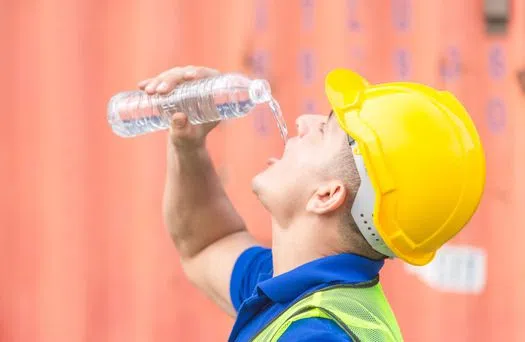
A worker takes a drink of water. Adobe Stock photo from INS.
DES MOINES, Iowa (KELO.com) — People across the Midwest, including Iowans, have dealt with a series of heatwaves this summer.
Health experts say hotter weather is harder on the heart, and outdoor construction workers need to be extra mindful.
Cities like Des Moines, Waterloo, and Sioux City are expected to see temperatures well above 90 degrees in the next several days, prompting reminders for vulnerable populations to protect themselves from the hot and humid conditions.
Lisa Leighton, senior project controls manager for the construction firm Ryan Companies, said workers on building sites should know the dangers, too.
“Construction workers are more susceptible to heat strokes and heat exhaustion, due to the fact that they’re working outside,” Leighton explained. “And workers in the construction industry have a higher prevalence of cardiovascular disease than employees in other fields.”
She cited findings from the American Heart Association (AHA), which works with companies like Ryan on the “Hard Hats with Heart” campaign, an outreach to construction workers about their elevated health risks.
During heat waves, Leighton suggested starting the day earlier to avoid the hot afternoon sun, as well as taking regular breaks, staying hydrated and wearing lighter clothing.
The AHA said construction workers with heart disease are already 60% more likely to retire on disability and to retire early because of poor health.
Leighton asserted it is especially important to protect themselves in hot weather, and hopes site managers take extra notice as well.
“Making sure they’re watching for some of those signs of heat exhaustion or heat stroke, and possibly even tell the workers that they need to take that break,” Leighton urged.
She added even though staying on schedule is important for construction projects, safety is the biggest priority.
Some symptoms to look out for include headaches, dizziness, muscle cramps, and fast and shallow breathing. If a worker displays these signs, they are advised to find a shady spot, douse themselves with cold water, get rehydrated and possibly seek medical attention.
(Mike Moen, INS, contributed this report.)




